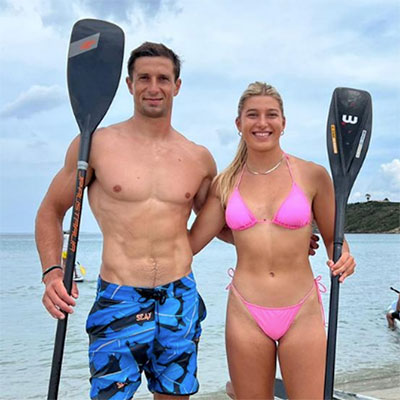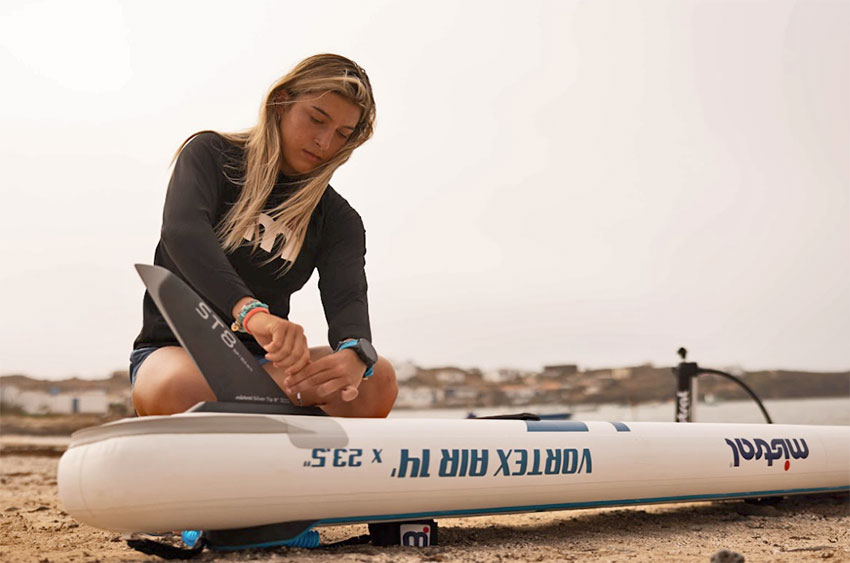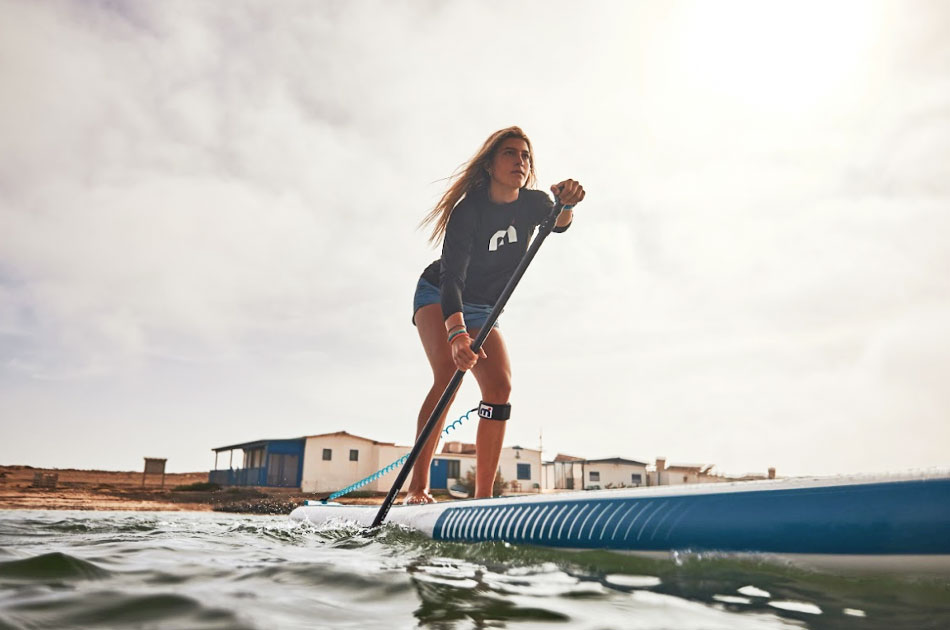By Steve West
Cecilia Pampinella first made a name for herself when in August 2021, at just 15 years of age, and in line with rules that state, ‘A paddler of any age can race in the open division,’ she became the youngest competitor in the seven-year history of the Euro Tour to win an open elite division race when still officially an under-16 division paddler. Cecilia went on to dominate the junior division of the 2022 ISA World Championships in the same year, winning gold medals for the sprint, technical and distance disciplines, thus claiming the title of ICF Junior World Champion. Today, at just 17 and growing stronger each year, she’s continuing to shake things up in the elite women’s division until she fully transitions in 2024 as an open-age paddler.
A paddler of this calibre, with this level of devotion and passion, is highly positive for SUP sport and the discipline of women’s racing, paying homage to the expression ‘The Youth are our Future’ representing a generation of paddlers no longer a part of the pioneering process but beneficiaries of a maturing sport and all that it has to offer. Taking up SUP when just 12 in 2018, she was immediately addicted to the sensation of having a board under her feet and the motion of swinging a paddle. For Mistral, it’s a perfect synergy and evolutionary process in nurturing a maturing young athlete dedicated to becoming an open elite World Champion and, if politics allows, a possible Olympic contender in 2028.

Cecilia grew up in the ancient Italian harbour side city of Civitavecchia, 60 km west-northwest of Rome,and began stand-up paddleboarding in 2018 with her talented brother Tommaso. Though not a region associated with water athletes, she set her goals very early, partly inspired by her brother’s abilities and love of water sports. ‘I first began stand-up paddling with my brother, Tommaso. I was in love with it from the first time I tried it. During this time, my primary sport was beach volleyball creating a conflict of choice in practising both sports. I liked SUP more than volleyball, so the choice was easy. From the beginning, my natural strength helped me a lot in my training and obtaining good board speed, and now that I am a Junior World Champion, I am very proud of what I have achieved.
At such a young age, to be so focused on a competitive water sport far away from the sport’s origins and where the gene pool is thin takes an extra level of dedication and ability to succeed. When asked what level of coaching assistance she has received, ‘In the beginning, my brother Tommaso was my coach as he is an excellent paddler. Today I have the athletics coach of the Italian Olympic Team assisting me. I also rely upon others for inspiration, especially American Fiona Wylde, whom I have always admired as a participant in many water sports; windsurfing, wing foiling, SUP and SUP surf. When I began racing against her, we soon became friends so that now we talk a lot which makes me happy. When I took up the sport, I always saw her as someone to aspire to and match competitively, and now that I can talk with her freely whenever I want, it feels great.’
An event that most all paddlers put on their list is the famous Hawaiian race between the islands of Moloka’i and Oahu, the Moloka’i Hoe, crossing 32 miles (52 km) over the Kaiwi Channel and, more recently, the Molokai Holokai Ho’olaule’a has grown in prominence. Though still young and with paddlers equal her age and younger who have made the crossing, Cecilia is naturally a little cautious, ‘The Molokai is one of the most important and toughest races, but not everyone can do this race as there is a lot of preparation needed to do it; it can also be quite dangerous, but one day for sure I would like to make this race. My brother will compete in the Moloka’i this year, so I look forward to hearing about his experience.’
As the pinnacle of downwind paddling and a testimony to the waterman and woman narrative in being at one with the ocean and the elements, the race is considered ‘safe’ given the support boat cover required for each paddler and the preparation required to enter. The difficult part for Cecilia is geographical proximity and the specificity of training for an open water event such as Moloka’i. ‘Training is the key as it’s a long race, and I’m more used to ten and twelve-kilometre races in relatively flat water. The Moloka’i is a long race, so you have to prepare specifically for an event like this, and of course, you have to be skilled in downwind paddling. In Hawaii, they have the wind and the waves, and if you don’t live with these conditions, I think it would be challenging to do well.’
Cecilia has been competitive in the open elite division since 2021. Now that she competes more regularly in this division, it may seem surprising that she should be so competitive early on. However, considering her natural ability, physical size, and strength at such a young age, it seems little wonder that other junior-age paddlers have struggled to match her form and that she is contesting the lead open paddlers. ‘Even though I am still of junior age, I am putting myself up against the top open women paddlers older than me so that I can improve and push harder to improve. They are stronger than me, but that’s OK; it’s what I need to improve.’ This is a training tactic commonly used by naturally gifted young athletes, and provided she can avoid injury; it will accelerate her physical and mental development.
On the politics of the International Canoe Federation (ICF) and International Surfing Association (ISA), two bodies that claim ownership of SUP sport, Cecilia sees no value in rejecting one over the other, which shows great maturity in setting aside politics and simply focusing on the importance of competitive events. ‘I support both, and even though they are different, they both offer World Championships, so they are both important, so it feels important to me to compete in their respective events and not choose one over the other.’
When asked which discipline she feels most comfortable doing, it’s clear that she is leaning more towards distance events as she matures and relishes challenging conditions. ‘I like all three disciplines, sprint, technical and long distance, and so I train for all three, and so far, I have been competitive in all of them, but right now, I feel that I am leaning more towards favouring distance paddling, and increasingly downwind and rough water conditions as don’t like flat water racing particularly as I find it a little boring.’ These are sure signs of the development of an ocean racing paddler. Regarding tactics, her approach has been simple and effective so far, but as the stakes get higher and the level of competition improves, it may need a higher level of analysis. ‘I like to know who is racing, try to study them a little, and consider how I will stay with them in the race. I formulate a strategy for each race, which helps me paddle well. I don’t make too much of a study of the race course, but in the morning on race day, I take notice of the wind and waves and other factors.’
Given Cecilia’s young age and despite her brother’s diverse interest in water sports, she has largely devoted her energies to SUP racing as her primary sport, but no doubt, with time, her cross-platforming water activities will expand and no doubt Mistral shall be on hand to nurture her interests. However, she succeeded in the ISA SUP surfing competition, taking out a gold medal in the juniors to complete the full haul of disciplines. ‘Stand-up paddling is my principal sport, but I also competed in the European and World Championship SUP wave, which I like but I prefer SUP racing. For training, SUP surfing is excellent, but it’s not something I like to do for competition.’
Regarding her race boards, Cecilia has competed on Mistral’s Vortex SD1 boards with great success and podium wins. Recently she has been riding a hybrid race board that’s in development, and regarding board specification for her riding style, ’I like a lightweight board with low volume or at least less than some of the larger stand-inside boards you see. High-volume (high-sided) boards for women paddlers are not so good; they are difficult to manage and handle in strong side winds.’ Asked whether she prefers wet low-profile boards or dry high-profile boards, ’Something in between with a dished (domed) deck, but not flat; the dished deck is a better sensation for my feet, allowing me to put more pressure on the paddle to go faster. I prefer a board around 21′ wide for flat water and technical racing, but not in the waves. For the waves, when going in and out through the surf, a flatter deck board is better so that water can spill off the deck and not fill up the standing area.’
Cecilia is now entering her third year with Mistral, and the relationship is strengthening. Before she came to Mistral, she knew of the brand, ‘I knew Mistral from the T-Shirts and clothing I would see in Italy, but also I knew about its connection with Windsurfing and knew it was a very significant brand in this sport, but I also knew about their SUP race and surfboard designs. I am doing very well with Mistral and all the team that works with the brand; I appreciate what they do for me, and they always try to help me when I need something. I like the relationship, and I now have a relationship with other team riders, such as Brazilian champion surfer Karol Ribeiro, multiple Dutch SUP champion, and multiple 11 Cities SUP winner Petronella van Malsen, which makes me very happy. Our recent photoshoot on the island of Fuerteventura was a great opportunity to meet everyone and feel part of a team and a family.’
Asked how she saw the future of stand-up paddle board racing, ‘I think globally, it is growing; I see this in Spain and France and in areas I compete in, perhaps not so much in Italy, and I hope that by 2028 SUP will be at the Olympics in Los Angeles, by which time I will be 22 and much stronger so this would be the perfect time for me.’
This young, dynamic, ambitious SUP competitor with professional aspirations sets her apart as a stand-out winner, serving to inspire other young paddlers and for which the sport is better off and for Mistral, the beneficiary of a possible future Olympian and no doubt a paddler with plenty more podium wins and accolades to come.


